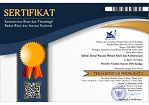Muslim women adhering to Minangkabau’s bajapuik tradition in Cirebon, West Java: compromizing a gendered culture in Islamic law
Abstract
Keywords
Full Text:
PDFReferences
Al-Jaziri, A.-R. (1990) Kitāb al-Fiqh ’ala al-Mazahib al-Arba’ah. 4th edn. Beirut: Dār al-Kutub al-Ilmiyyah.
Al-Syarbini, M. al-K. (1994) Al-Iqnā’ fī Hall Alfāz}i Abī Syujā’. Beirut: Dār al-Fikr.
Al-Zuhaili, W. (2009) Al-Tafsīr al-Munīr fī al-’Aqīdah al-Syarī’ah wa al-Manhāj. Beirut: Dār al-Fikr.
Ambrus, A., Field, E. and Torero, M. (2010) ‘Muslim Family Law, Prenuptial Agreements, and the Emergence of Dowry in Bangladesh’, The Quarterly Journal of Economics, 125(3), pp. 1349–1397.
Amir M.S. (2007) Adat Minangkabau: Pola Tujuan Hidup Orang Minang. Jakarta: Mutiara sumber Widya.
Aprizal, M. (2010) Eksistensi Tradisi Bajapuik dalam Perkawinan Masyarakat Pariaman Minangkabau Sumatera Barat. Institut Pertanian Bogor.
Arat, Z.F.K. (2015) ‘Feminisms, Women’s Rights, and the UN: Would Achieving Gender Equality Empower Women?’, The American Political Science Review, 109(4), pp. 674–689.
Aziz, E., Dzofir, M. and Widodo, A. (2020) ‘The Acculturation of Islam and Customary Law: an Experience of Minangkabau, Indonesia’, Qudus International Journal of Islamic Studies (QIJIS), 8(1), pp. 131–160. doi:10.21043/qijis.v8i1.7197.
Azwar, W. (2011) Matrilokal dan Status Perempuan dalam Tradisi Bajapuik. Yogyakarta: Galang Press.
Azzam, A.A.M. and Hawwas, A.W. (2014) Fiqh Munakahat: Khitbah, Nikah, dan Talak. Jakarta: Amzah.
Bahardur, I. et al. (2022) ‘Matrilineal marriage traditions and hegemonic masculinity in Marah Rusli’s Sitti Nurbaya’, Masculinities and Social Change, 11(1), pp. 26–51.
Bailey, L.E. and Graves, K. (2016) ‘Gender and Education’, Review of Research in Education, 40(Education Research: A Century of Discovery), pp. 682–722.
Blackwood, E. (2010) ‘Representing Women: The Politics of Minangkabau Adat Writings’, The Journal of Asian Studies, 60(1), pp. 125–149. doi:10.2307/2659507.
Brenner, S. (1996) ‘Reconstructing Self and Society: Javanese Muslim Women and “The Veil”’, American Ethnologist, 23(4), pp. 673–697.
Chan, N. (2021), personal interview in Cirebon, 20 January.
Hadikusuma, H. (1990) Pokok-pokok Pengertian Hukum Adat. Bandung: Alumni.
Hadikusuma, H. (2010) Antropologi Hukum Indonesia. Bandung: Alumni.
Harding, S. (1982) ‘Is Gender a Variable in Conceptions of Rationality? A Survey of Issues’, Dialectica, 36(2/3), pp. 225–242.
Hendra, K. (2021), personal interview in Cirebon, 1 February.
Huda, M.C. (2022) Metode Penelitian Hukum: Pendekatan Yuridis Sosiologis. Edited by I. Muhsin. Salatiga: The Mahfud Ridwan Institute.
Ibn ’Abidin, M.A. (2003) Radd al-Muh}tār ‘alā ad-Dur al-Muhkhtār. 3rd edn. Beirut: Dār al Kutub al-’Ilmiyyah.
Jamna, J. (2004) Pendidikan Matrilineal. Padang: Guna Tama.
Kesuma, M.I. (2021), personal interview in Cirebon, 18 January.
Khalfaoui, M. (2020) ‘Current Muslim Understandings of Classical Family Law in a Modern Secular Context: Germany as a Case Study’, Journal of Muslim Minority Affairs, pp. 1–11. doi:10.1080/13602004.2020.1741163.
Khallaf, A.W. (2014) ’Ilm Us}ūl al-Fiqh. Beirut: Dār al-Fikr.
Malinowski, B. (1958) The dynamics of culture change: an inquiry into race relations in Africa. Edited by P.M. Kaberry. New Haven: Yale University Press.
Nazwir, K. (2021), personal interview in Cirebon, 3 February.
Nurdin, Z. (2022) ‘Legal protection of customary rights under legal pluralism and its impact on the minangkabau society: An empirical study in the district of Lima Puluh Kota, West Sumatra’, Cogent Social Sciences, 8(1), pp. 1–10. doi:10.1080/23311886.202 2.2045722.
Piliang, E., Sungut, N.D.M. and Arfianda, H. (2011) Tambo Minangkabau (Budaya dan Hukum Adat di Minangkabau). Yogyakarta: Galang Press.
Rapoport, Y. (2000) ‘Matrimonial Gifts in Early Islamic Egypt’, Islamic Law and Society, 7(1), pp. 1–36.
Rasyad, Z. (2009) Ranah dan Adat Minangkabau. Jakarta: Agra Wirasanda. Razak, Y. and Nurtawaban, E. (2007) Antropologi Agama. Jakarta: UIN-Jakarta Press.
Roslaili, Y. (2019) ‘Kajian ‘Urf tentang Adat Ranub Kong Haba dan Akibat Pembatalannya di Aceh’, Samarah: Jurnal Hukum Keluarga dan Hukum Islam, 3(2), pp. 417–437.
Schrijvers, J. and Postel-Coster, E. (1977) ‘Minangkabau Women: Change in a Matrilineal Society’, Archipel, 13, pp. 79–103.
Setianto, Y.P. (2015) ‘Mediatization of Religion: How the Indonesian Muslim Diasporas Mediatized Islamic Practices’, Journal of Media and Religion, 14(4), pp. 230–244.
Siregar, F.A. et al. (2022) ‘Merantau in The Ethnic Tradition of Minangkabau: Local Custom Without Sharia Basis?’, Samarah: Jurnal Hukum Keluarga dan Hukum Islam, 6(1), pp. 115–138. doi:10.22373/sjhk.v6i1.9954.
Sudiyat, I. (1995) Azas-azas Hukum Adat. Yogyakarta: Liberty.
Taylor, R. (2015) ‘Syariah as Heterotopia: Responses from Muslim Women in Aceh, Indonesia’, Religions, 6(2), pp. 566–593. doi:10.3390/rel6020566.
Tono, S. et al. (2019) ‘The harmonious relationship between minangkabau custom and Islam in the distribution of inheritance’, Al-Shajarah: Journal of the International institute of Islamic Thought and Civilization (ISTAC), 24 (Special Issue: Shariah and Law as Catalysts for Global Peace), pp. 39–55.
Valentina, T.R. and Putera, R.E. (2007) ‘Posisi Perempuan Etnis Minangkabau dalam dunia Patriarki di Sumatera Barat dalam Perspektif Agama, Keluarga dan Budaya’, Demokrasi, 6(2), p. 17.
Wani, M.A. (2001) ‘Muslim women’s right to “mahr”: an appraisal of the statutory laws in muslim countries’, Journal of the Indian Law Institute, 43(3), pp. 388–409.
Yunita, R., Syaiful M, S. and Basri, M. (2013) ‘Uang Japuik dalam Adat Perkawinan Padang Pariaman di Bandar Lampung’, Jurnal Pendidikan dan Penelitian Sejarah, 1(1), pp. 1–15.
Zakia, R. (2011) ‘Kesetaraan dan keadilan gender dalam adat Minangkabau’, Kafaah: Jurnal Ilmiah Kajian Gender, 1(1), pp. 39–52.
Zuhaili, W. al- (2002) Al-Fiqh al-Islami wa Adillatuhu. Damascus: Dār al-Fikr
DOI: https://doi.org/10.18326/ijtihad.v22i2.135-154
Refbacks
- There are currently no refbacks.

This work is licensed under a Creative Commons Attribution-NonCommercial-ShareAlike 4.0 International License.
Ijtihad: Jurnal Wacana Hukum Islam dan Kemanusiaan by http://ijtihad.iainsalatiga.ac.id/ is licensed under a Creative Commons Attribution-ShareAlike 4.0 International License







